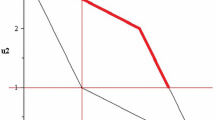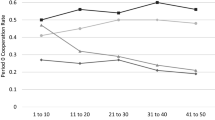Abstract
A duel involves two stationary players who shoot at each other until at least one of them dies; a truel is similar but involves three players. In the past, the duel has been studied mainly as a component of the truel, which has received considerably more attention. However we believe that the duel is interesting in itself. In this paper we formulate the duel (with either simultaneous or sequential shooting) as a discounted stochastic game. We show that this game has a unique Nash equilibrium in stationary strategies; however, it also possesses cooperation-promoting Nash equilibria in nonstationary strategies. We show that these are also subgame perfect equilibria. Finally, we argue that the nature of the game and its equilibria is similar to that of the repeated Prisoner’s dilemma.




Similar content being viewed by others
Data Availability
We do not analyze or generate any datasets, because our work proceeds within a theoretical and mathematical approach.
Notes
There is no loss of generality in assuming \(a_{1}=1\), because \(\Pi _{1}\left( \delta \right) \) is homogeneous in \(a_{1}\) and \(b_{1}\).
Of course, when the game is in \(\left( 2,1,0\right) \), \(P_{2}\) is supposed to have the shot, but he cannot actually shoot, since he is already dead; similarly for \(\left( 1,0,1\right) \) and \(P_{1}\).
References
Aumann RJ, Shapley LS (1994) Long-term competition—a game-theoretic analysis. Essays in game theory. Springer. pp. 1–15
Amengual P, Toral R (2005) Distribution of winners in truel games. AIP Conference Proceedings, pp. 128–141
Amengual P, Toral R (2005) A Markov chain analysis of truels. In: Proceedings of the 8th granada seminar on computational physics
Amengual P, Toral R (2006) Truels, or survival of the weakest. Comput Sci Eng 8:88
Barron EN (2013) Game theory: an introduction. Wiley, New York
Bossert W, Brams SJ, Kilgour DM (2002) Cooperative vs non-cooperative truels: little agreement, but does that matter? Games Econom Behav 40:185–202
Brams SJ, Kilgour DM (1997) The truel. Math Mag 70:315–326
Brams SJ, Kilgour DM (2001) Games that End in a Bang or a Whimper. preprint, CV Starr Center for Applied Economics
Brams SJ, Kilgour DM, Dawson B (2003) Truels and the future. Math Horizons 10:5–8
Dorraki M, Allison A, Abbott D (2019) Truels and strategies for survival. Sci Rep 9:1–7
Dresher M (1961) Games of strategy: theory and applications. Prentice-Hall, Englewood Cliffs
Filar J, Vrieze K (2012) Competitive Markov decision processes. Springer, Berlin
Gardner M (1966) New mathematical puzzles and diversions. pp. 42-49
Karlin S (1959) Mathematical methods and theory in games, programming, and economics, vol 2. Addison- Wesley, Boston
Kilgour DM (1971) The simultaneous truel. Internat J Game Theory 1:229–242
Kilgour DM (1975) The sequential truel. Internat J Game Theory 4:151–174
Kilgour DM (1977) Equilibrium points of infinite sequential truels. Internat J Game Theory 6:167–180
Kinnaird C (1946) Encyclopedia of puzzles and pastimes. Secaucus
Knuth DE (1972) The Triel: a new solution. J Recreat Math 6:1–7
Larsen HD (1948) A dart game. Am Math Mon, pp. 640-41
Mosteller F (1987) Fifty challenging problems in probability with solutions. Courier Corporation, Chelmsford
Shubik M Does the fittest necessarily survive?. Readings in game theory and political behavior, Doubleday
Sobel MJ (1971) Noncooperative stochastic games. Ann Math Stat 42:1930–1935
Takahashi M (1964) Equilibrium points of stochastic non-cooperative \(n\)-person games. J Sci Hiroshima Univ Ser AI (Math) 28:95–99
Toral R, Amengual P (2005) Distribution of winners in truel games. In: AIP Conference Proceedings, vol. 779. American Institute of Physics
Webb JN (2007) Game theory: decisions, interaction and evolution. Springer, Berlin
Wegener M, Mutlu E (2021) The good, the bad, the well-connected. Internat J Game Theory 50:759–771
Xu X (2012) Game of the truel. Synthese 185:19–25
Zeephongsekul P (1991) Nash Equilibrium Points Of Stochastic \(N\)-Uels. Recent developments in mathematical programming. CRC Press, pp. 425–452
Funding
No funding was received to assist with the preparation of this article
Author information
Authors and Affiliations
Contributions
All the work reported in this article was performed by AK.
Corresponding author
Ethics declarations
Conflict of interest
The author has no competing interests to declare that are relevant to the content of this article.
Ethical Approval
This is not applicable to this article, because it does not include human and/ or animal studies.
Additional information
Publisher's Note
Springer Nature remains neutral with regard to jurisdictional claims in published maps and institutional affiliations.
Rights and permissions
Springer Nature or its licensor (e.g. a society or other partner) holds exclusive rights to this article under a publishing agreement with the author(s) or other rightsholder(s); author self-archiving of the accepted manuscript version of this article is solely governed by the terms of such publishing agreement and applicable law.
About this article
Cite this article
Kehagias, A. The Duel Discounted Stochastic Game. Dyn Games Appl 14, 846–864 (2024). https://doi.org/10.1007/s13235-023-00540-9
Accepted:
Published:
Issue Date:
DOI: https://doi.org/10.1007/s13235-023-00540-9




